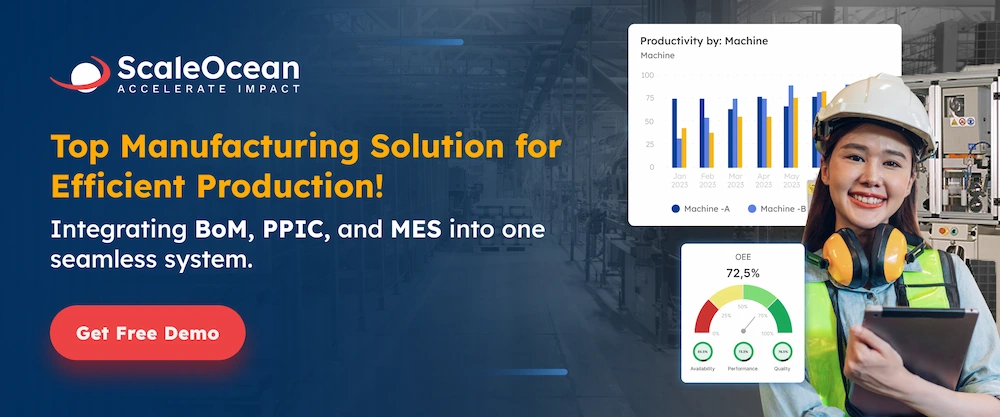In 2025, the demand for efficient ERP software in Singapore’s manufacturing industry is skyrocketing. With over 90% of manufacturers in Singapore adopting digital solutions, selecting the right ERP system is crucial for staying competitive.
Manufacturing ERP software streamlines operations, enhances data visibility, and supports scalability for businesses aiming to optimize production, inventory, and supply chain management. As companies increasingly shift to automation and digitalization, choosing the best ERP solution can make or break their efficiency and growth.
In this article, we will explore the top 12 manufacturing ERP software options in Singapore, each tailored to meet the unique needs of the local industry, helping businesses make informed decisions for success in 2025 and beyond. Learn more here!
- Manufacturing ERP software is an all-in-one solution aimed at integrating and optimizing every aspect of a manufacturing operation.
- The types of manufacturing ERP are on-premise, cloud-based, and hybrid
- Modules of manufacturing ERP, such as production planning and scheduling, inventory management, quality control, SCM, financial management, and shop floor control
- The top 12 manufacturing ERP systems for Singapore companies are: ScaleOcean, Microsoft Dynamics 365, Odoo, SAP S/4 HANA, Oracle, Epicor, Dollibar, and NetSuite
- ScaleOcean is the best choice for manufacturing companies with system customization according to business needs, as well as flat prices with unlimited users at no additional fee.
What is a Manufacturing ERP (Enterprise Resource Planning) System?
Manufacturing ERP software is a system that unifies essential business functions, such as production planning, supply chain management, and inventory control, within a single platform, enhancing efficiency and providing better visibility.
Understanding the various types of manufacturing processes is crucial for selecting the ideal ERP system to efficiently streamline these operations. It has key functions, such as inventory management, production planning and scheduling, supply chain management, financial management, order management, and CRM, to HRM.
It integrated a manufacturing system and various departments and processes for automating workflows, enhancing data visibility, and supporting more informed decision-making. This system helps manufacturers streamline operations, meet customer demands, and adapt to market changes effectively.
Benefits of ERP Manufacturing
Modern manufacturing ERP systems help companies in Singapore streamline operations, cut costs, and provide real-time insights, enhancing decision-making and driving growth to stay competitive. Below, we explore the key benefits of modern ERP systems for manufacturers, including:
1. Increased Efficiency
Manufacturing ERP software automating processes and improving data visibility leads to faster and more efficient operations. By eliminating manual processes in manufacturing production, it accelerates production cycles and improves resource utilization.
A manufacturing ERP system also helps track inventory, orders, and production schedules, ensuring smoother operations.
2. Better Decision-Making
The system provides real-time data and insights that enable managers to make informed decisions, such as on inventory levels, production status, and financial performance. It enables companies to analyze trends, identify bottlenecks, and forecast demand accurately.
By leveraging accurate, up-to-date information, businesses can make strategic choices that drive growth, improve profitability, and ensure long-term sustainability.
3. Reduced Costs
Manufacturing software optimizes processes, and reducing waste leads to significant cost savings. With tools like Singapore manufacturing cost estimating tools, automated workflows reduce labor costs and errors, while predictive maintenance prevents costly breakdowns, enabling reinvestment in growth initiatives.
4. Improved Customer Satisfaction
ERP manufacturing can also help companies to get better order fulfillment, and faster response times can improve customer satisfaction. It can improve order accuracy, delivery times, and communication in real-time with tracking of orders and inventory to ensure timely fulfillment, while automated workflows reduce processing delays.
5. Enhanced Collaboration
Manufacturing software and also unified platform facilitate better communication and collaboration between departments. Teams can access shared data, ensuring everyone works with the same information. This improves coordination between production, sales, inventory, and finance teams, reducing misunderstandings and delays.
6. Freeing Up Employees for Strategic Work
The system automates repetitive tasks like inventory management and data entry, allowing employees to focus on strategic initiatives. By reducing manual workloads, teams can dedicate time to innovation, process improvement, and driving business growth, ultimately boosting productivity and competitiveness.
7. Identify New Opportunities Sooner
With real-time data analytics and reporting, modern ERP systems provide actionable insights into market trends and customer behavior. Manufacturers can quickly spot emerging opportunities, adapt to changing demands, and make informed decisions to stay ahead of competitors.
8. Seamless Integration of All Current Business Processes
Manufacturing ERP can integrate finance, supply chain, production, and sales into a single platform, eliminating data silos and improving communication. This integration ensures smoother operations, increasing efficiency and decision-making, as seen with ERP medical devices for Singapore manufacturers.
Manufacturing ERP vs. a Standard/Generic ERP: The Differences
When choosing an ERP system, businesses often face the decision between a manufacturing-specific ERP and a standard, generic ERP solution. While both types of systems aim to streamline operations and improve efficiency, they differ significantly in their design and functionality.
Here are the key differences between manufacturing ERP and standard/generic ERP, including:
1. Manufacturing ERP
Manufacturing ERP software is designed to meet the specific needs of manufacturing businesses, covering all production processes. Singapore’s food industry ERP software, for example, offer specialized features to streamline operations and enhance efficiency in food production.
Including: bill of materials (BOM), work order management, shop floor control, and material requirement planning (MRP). These features help manage the complexities of manufacturing, such as tracking raw materials, managing production schedules, and optimizing resource usage.
2. Standard/Generic ERP
In contrast, standard or generic ERP systems are broader in scope and are used across various industries. They cover functions like finance, HR, sales, and supply chain management, but may lack the specialized tools required for managing production processes in a manufacturing environment.
While a generic ERP system can be customized to a degree, it typically doesn’t have the same depth in production-related features as a manufacturing-specific ERP system.
The key difference lies in the level of specialization. Manufacturing ERPs focus on optimizing production efficiency, ensuring product quality, and meeting industry-specific regulations. Standard ERPs, while versatile, do not offer the same level of integration for production-centric activities.
6 Signs Your Manufacturing Business Needs an ERP
Recognizing whether your manufacturing company requires an ERP system is critical to preserving efficiency and competitiveness. Disorganized processes, data errors, and scaling issues are all warning indicators. The following are five signs that it’s time to invest in an ERP solution.
1. Inefficient Inventory Management
If your business struggles with managing stock levels, frequent stockouts, or overstocking, it may be time for a manufacturing ERP system. An ERP can automate inventory tracking, optimize reorder points, and provide real-time visibility into stock levels, helping to reduce waste and improve order fulfillment.
2. Lack of Real-Time Data
If decision-making is hindered by outdated or incomplete information, a manufacturing ERP can centralize data across departments, providing real-time insights into production, sales, and financials. This enables timely decision-making and allows your team to act on current, accurate data.
3. Manual and Time-Consuming Processes
If your team is still using spreadsheets, paper-based systems, or manual processes, a manufacturing ERP system can automate routine tasks such as production scheduling, order processing, and financial reporting. This reduces the risk of errors, frees up time for more strategic tasks, and increases overall efficiency.
4. Difficulty Scaling Operations
As your business grows, managing increased production and more complex processes becomes challenging without a system in place. A manufacturing ERP can scale with your business, providing the flexibility to handle higher production volumes, new product lines, and expanded operations without disrupting existing workflows.
5. Poor Communication Across Departments
If there is a lack of coordination between departments such as sales, production, and procurement, it can lead to delays, errors, and inefficiencies. An ERP integrates all key functions into a single platform, promoting better collaboration, improving communication, and ensuring everyone has access to the same data.
6. Compliance and Reporting Issues
If your company struggles to stay compliant with industry regulations or generate accurate reports, a system can simplify these tasks. It ensures that data is consistently updated, helps track regulatory requirements, and generates accurate, timely reports for compliance audits.
Types of Manufacturing ERP Implementation
Manufacturing ERP implementation types vary based on business needs, resources, and goals. Choosing the right approach ensures a smooth transition and maximizes ROI, especially as manufacturing ERP trends increasingly favor more flexible and scalable solutions.
Below, we explore the most common ERP implementation strategies for manufacturers, including:
1. On-Premise Manufacturing ERP
On-premise ERP entails installing software on local servers within the company’s architecture. It provides complete data management and customization, but demands a considerable upfront investment as well as IT personnel for maintenance and updates.
2. Cloud-Based Manufacturing ERP
Cloud ERP is hosted on the vendor’s servers and accessed via the internet. It offers scalability, lower upfront costs, and automatic updates. This type is ideal for businesses seeking flexibility and remote access to real-time data.
3. Hybrid Manufacturing ERP
Hybrid ERP combines on-premise and cloud solutions, allowing businesses to keep sensitive data on-site while leveraging cloud benefits for other operations. It offers a balanced approach, catering to specific security and scalability needs.
If you’re looking for flexible manufacturing software for system implementation, ScaleOcean is your best option. ScaleOcean’s highly flexible design allows you to implement various hosting types for your manufacturing ERP software to meet your specific company needs, from data control, operational flexibility to implementation costs.
For more information, sign up for a free demo now!
Key Features and Modules of Manufacturing ERP Software
Manufacturing ERP modules and features are specialized components designed to address specific operational needs in production environments. These modules streamline processes, enhance efficiency, and provide real-time insights.
The following will look at the key features and modules of the manufacturing ERP system, including:
1. Production Control and Scheduling
Manufacturing ERP software helps optimize production planning by creating detailed schedules based on resource availability and demand.
It allows businesses to manage workflows, reduce downtime, and ensure that production runs smoothly by automating scheduling tasks, improving lead times, and enhancing on-time delivery performance.
2. Inventory and Warehouse Management
With real-time inventory tracking and automated replenishment, implementing manufacturing ERP systems ensures that stock levels are optimized.
This feature minimizes the risk of stockouts or overstocking, streamlines warehouse operations, and provides end-to-end visibility into inventory, allowing businesses to improve inventory turnover and reduce holding costs.
3. Supply Chain Management
The systems integrate supply chain processes to ensure seamless coordination from procurement to delivery. It improves visibility and communication between suppliers, manufacturers, and customers, allowing businesses to manage orders, track shipments, and optimize procurement and logistics to reduce delays and costs.
4. Bill of Materials (BOM) Management
Manufacturing ERP software provides detailed BOM management to structure and organize the components needed for production. By managing materials and components efficiently, this feature helps reduce errors, ensures the accurate procurement of parts, and supports cost tracking for every unit produced, streamlining the production process.
5. Lot and Serial Traceability
It provides the ability to track the movement of goods through serial numbers or lot codes, which is essential for industries with strict traceability requirements.
The system also ensures that products can be traced back through each stage of the supply chain, helping businesses manage recalls, improve quality control, and ensure compliance with industry standards.
6. Quality and Compliance Management
A key feature of manufacturing ERP systems is their ability to monitor quality control and ensure compliance with industry regulations.
It allows businesses to automate quality checks, track defects, and maintain accurate records, ensuring products meet regulatory standards and that the company remains compliant with environmental and safety requirements.
7. Financial and Accounting Integration
The manufacturing system integrates financial management into the manufacturing process, allowing businesses to manage invoicing, cost tracking, and financial reporting from a centralized platform.
This integration ensures accurate financial oversight, better budgeting, and seamless coordination between finance and production departments to track profitability and control costs.
8. Service and Support
The system also offers tools for managing post-production services and customer support. With integrated service management features, businesses can schedule maintenance, track service requests, and provide timely support, ensuring the correct product lifecycle process for consistent product performance.
It also improves customer satisfaction, reduces downtime, and ensures that product performance remains consistent after delivery.
12 Examples of Manufacturing ERP Systems
When exploring robust software solutions tailored for manufacturing operations, it’s essential to understand how the right manufacturing ERP platform can transform productivity, streamline workflows, and support scalability.
Below, we showcase 12 examples of manufacturing ERP systems that are designed to help manufacturers integrate production control, inventory oversight, supply chain coordination, and financial management into a unified platform. Learn more here!
1. ScaleOcean Manufacturing ERP System
The ScaleOcean Manufacturing ERP system is an all-encompassing software designed to optimize and automate manufacturing operations. This system integrates various aspects of the production process, including raw material management, production scheduling, cost tracking, and equipment efficiency.
It ensures seamless coordination between production, procurement, inventory, and accounting departments, providing real-time visibility and control over manufacturing activities.
ScaleOcean ERP excels with its customizable, real-time data and cost-effective design. Seamlessly integrating procurement and sales, it boosts efficiency and decision-making. Request a free demo to see how it streamlines operations and enhances productivity, eliminating the need for fragmented systems.
Key features:
- Smart Material Requirement Planning (MRP): Predicts needs, ensures materials arrive on time for production.
- Integrated Production Scheduling & Cost Management: Plans production, tracks expenses, optimizes efficiency, and controls costs.
- Real-time Inventory and Warehouse Management: Monitors stock, tracks location, ensures accuracy, and prevents shortages.
- Multilevel Bill of Materials (BOM) and Costing: Manages product components, calculates costs, and tracks material usage.
- Automatic Order and Work Center Management: Streamlines orders, assigns tasks, optimizes workflow, and reduces manual effort.
| Pros | Cons |
|---|---|
|
|
2. Microsoft Dynamics 365
Microsoft Dynamics 365 is a versatile cloud-based manufacturing ERP solution designed for small to medium-sized businesses. It integrates core business processes, such as financial management, supply chain, also customer service.
This software provides real-time insight and facilitates data-driven decision-making. It also offers scalability and flexibility to adapt to evolving business needs.
Key features:
- Supply chain and procurement integration
- Financial management and reporting capabilities
- Integrates seamlessly with the Microsoft 365 suite
| Pros | Cons |
|---|---|
|
|
3. Odoo
Odoo is a highly popular ERP solution for small manufacturing businesses in 2025, streamlining the manufacturing process from BOM creation to automated reordering. Odoo is also a system that has a user-friendly interface, making it accessible for businesses with limited technical expertise.
Key features:
- Detailed job costing and quoting tools
- Real-time shop floor data collection
- Integrated scheduling and production control
| Pros | Cons |
|---|---|
|
|
4. SAP S/4HANA
SAP S/4HANA is designed for large enterprises to manage all aspects of manufacturing, from planning to execution. It also supports diverse manufacturing, including discrete and process manufacturing as well as make-to-stock and make-to-order processes.
Additionally, its real-time analytics capabilities enable businesses to make faster, data-driven decisions.
Key features:
- Integrated supply chain and logistics management
- Comprehensive financial and risk management tools
- In-memory database for rapid processing
| Pros | Cons |
|---|---|
|
|
5. Oracle
Oracle is an ERP manufacturing cloud-based designed to manage core business processes like accounting, procurement, and financial management.
Oracle also helps businesses with AI insight, optimizes operations, and improves decision-making efficiency. This system offers MRP management and SCM for the manufacturing process.
Key features:
- Integrated quality management and traceability
- Real-time inventory and production control
- Comprehensive financial and accounting tools
| Pros | Cons |
|---|---|
|
|
6. Epicor
Epicor Kinetic is an Enterprise Resource Planning (ERP) solution tailored for manufacturing enterprises. It integrates various business processes, including supply chain management, production, financials, and human resources, into a unified platform.
Designed to enhance operational efficiency, Kinetic offers both cloud-based and on-premises deployment options, providing flexibility to meet diverse business needs.
Key features:
- Advanced production planning and scheduling capabilities
- Real-time inventory and warehouse management systems
- Integrated product lifecycle management (PLM) tools
| Pros | Cons |
|---|---|
|
|
7. Dollibar
Dollibar manufactures open-source ERP solutions suitable for businesses, offering features for enterprise resource planning, customer relationship management, and various other activities.
It also provides a modular design that allows users to customize functionalities based on their specific needs.
- Advanced production planning and scheduling tools
- Global supply chain and distribution management
- Comprehensive financial and regulatory compliance
| Pros | Cons |
|---|---|
|
|
8. NetSuite
NetSuite ERP is a cloud-based manufacturing system that integrates core business processes, including manufacturing, financials, customer relationship management (CRM), and e-commerce.
Designed for scalability, it caters to both mid-sized and large enterprises, offering real-time data access and customizable features to streamline operations and enhance decision-making.
Key features:
- Real-time inventory and production management
- Integrated supply chain and procurement tools
- Comprehensive financial and accounting modules
| Pros | Cons |
|---|---|
|
|
9. Infor CloudSuite
Infor CloudSuite Industrial Manufacturing is a cloud-based system designed specifically for manufacturing companies. It integrates and automates core business processes, from order management and production planning to inventory control and financial reporting.
Essentially, it provides a centralized platform to streamline operations, enhance visibility, and drive efficiency across your entire manufacturing enterprise.
Key features:
- Comprehensive quality control and compliance management
- Real-time inventory and warehouse management
- Integrated financial and cost accounting modules
| Pros | Cons |
|---|---|
|
|
10. DELMIAWorks (IQMS)
DELMIAWorks (formerly IQMS) is a real-time software specifically engineered for discrete manufacturing. It’s designed to provide a single, unified system for managing all aspects of production, from the shop floor to the top floor.
This system focuses on providing visibility and control over manufacturing processes, quality, inventory, and financials, all within a single database.
Key features:
- Real-time shop floor data collection and analysis
- Integrated quality management and traceability
- Comprehensive production scheduling and planning
| Pros | Cons |
|---|---|
|
|
11. Acumatica
Acumatica Manufacturing Edition is a cloud-based ERP solution designed for small to medium-sized manufacturers. It provides a comprehensive suite of tools for managing production, inventory, materials, and financials, all within a unified platform.
Acumatica emphasizes flexibility and scalability, offering a modern, user-friendly interface that can be accessed from anywhere.
Key features:
- Integrated bill of materials and routing
- Advanced production scheduling and planning
- Comprehensive financial and project accounting
| Pros | Cons |
|---|---|
|
|
12. IFS Clouds
IFS Cloud Manufacturing is a cloud-native solution designed for asset-intensive and service-centric manufacturing industries. It offers a unified platform for managing enterprise resource planning, enterprise asset management (EAM), and service management.
It aims to provide end-to-end visibility and control across the entire asset and service lifecycle, from design and manufacturing to maintenance and disposal.
Key features:
- Integrated ERP, EAM, and service management
- Advanced asset lifecycle management capabilities
- Real-time project and resource management
| Pros | Cons |
|---|---|
|
|
What AI-Powered Manufacturing ERP Software Can Offer?
AI-powered manufacturing ERP software introduces a shift from reactive to proactive management, integrating technologies like machine learning (ML), predictive analytics, natural language processing (NLP), and robotic process automation (RPA) into traditional ERP systems.
This enables businesses to gain deeper insights, make faster decisions, and create adaptive workflows that align with the fast-paced manufacturing environment of today. Here’s how AI works to optimize manufacturing ERP systems.
1. Predictive Maintenance & Equipment Reliability
AI algorithms in manufacturing ERP software can analyze real-time data from machines, sensors, and shop-floor systems to identify patterns of wear or potential issues before they cause breakdowns.
This proactive maintenance approach helps minimize unexpected downtime, extend the lifespan of equipment, and optimize maintenance schedules, resulting in improved productivity and lower repair costs.
2. Intelligent Demand Forecasting & Inventory Optimization
AI-powered manufacturing ERP systems use historical sales data, market trends, and external factors (like economic or logistical shifts) to forecast demand with greater accuracy. As more companies embrace a smart factory in Singapore, this technology enables more precise forecasting, helping businesses stay agile and reduce inventory costs.
This enables automatic adjustments to inventory levels, reducing the risks of overstocking or stockouts, and aligning production more closely with actual market needs.
3. Dynamic Production Scheduling & Workflow Automation
AI enhances the systems by creating real-time production schedules that can adapt to machine downtime, rush orders, or material shortages. It recommends adjustments, such as reallocating staff or shifting production priorities, leading to shorter lead times, fewer bottlenecks, and more efficient use of resources.
4. Enhanced Quality Control & Traceability
With integrated AI and machine learning models, the system can inspect products for defects more accurately and quickly than manual methods. Combined with lot and serial traceability, this allows businesses to quickly identify root causes, reduce scrap, and ensure compliance with industry standards.
5. Process Automation & Decision Support
Robotic process automation (RPA) and AI-driven decision tools within manufacturing ERP systems automate repetitive tasks like invoice matching, order entry, and compliance checks. This automation allows businesses to shift focus from routine tasks to strategic initiatives, improving efficiency, accuracy, and overall workforce value.
6. Real-Time Visibility & Resilient Supply Chain
AI-powered manufacturing systems aggregate data from production, logistics, finance, and external markets to provide unified dashboards and alerts.
It enhances supply chain resilience by identifying risks, such as supplier delays or demand spikes, and enabling businesses to take quick corrective actions or explore alternative sourcing options.
7. Continuous Learning & Strategic Innovation
AI thrives on data and continuous feedback, which allows ERP systems to improve over time. With each interaction, the system refines forecasts, optimizes processes, and adapts to user behavior, providing businesses with a strategic tool for digital transformation that evolves alongside market changes.
In summary, AI-powered manufacturing ERP systems go beyond traditional software by turning raw data into predictive intelligence, transforming automation into flexibility, and integrating isolated functions into synchronized, agile workflows.
It makes implementing the systems invaluable for businesses aiming to scale and stay competitive in today’s fast-moving marketplace.
How to Choose the Best Manufacturing ERP Software
Choosing the right Manufacturing ERP for your business in Singapore requires careful consideration of local market characteristics, regulations, and specific business needs. Below are key factors to consider to ensure the ERP implementation delivers maximum results.
1. Understand Your Business Needs
Start by identifying the specific challenges in production, inventory management, supply chain, and financial reporting. The system should address these pain points, offering specialized modules like production scheduling, quality control, and real-time inventory tracking, such as manufacturing ERP software for the chemical industry.
2. Scalability and Flexibility
Your manufacturing ERP system should be able to scale as your business grows, handling increased production volumes, new product lines, or additional users without disrupting operations. Ensure the vendor offers flexibility in configuration and module addition to adapt to business changes.
3. Integration with Existing System
Make sure the systems can seamlessly integrate with your existing software, such as accounting, CRM, or a Singapore manufacturing execution system. Integration reduces data duplication, accelerates information flow across departments, and ensures data accuracy.
4. Essential ERP Features and Modules
For manufacturing, ensure the systems include essential modules like production planning, BOM management, lot/serial tracking, warehouse and logistics management, as well as quality and compliance. Generic systems might not have the depth required for manufacturing complexities.
5. User-Friendliness
The manufacturing ERP system should have an intuitive interface that is easy to navigate for all team members, from production workers to managers. A system with simple dashboards and mobile access reduces training time and increases user adoption, enhancing overall productivity.
6. Number of Users
Consider the number of users who will access the ERP system across production, warehouse, administration, and finance. Licensing and costs often depend on the number of users and access rights. Scalability in user numbers is crucial to keep costs manageable.
7. Cost vs. Value
In Singapore, ERP costs can vary, including licensing, implementation, training, and maintenance costs. Assess the Total Cost of Ownership (TCO) over time and compare it with the productivity and efficiency gains the ERP brings to ensure you get the best value.
8. Cloud vs. On-Premise Options Deployment
Decide between a cloud-based or on-premise ERP solution. Cloud systems offer flexibility, remote access, and lower upfront costs, while on-premise solutions may be more suitable if you need tighter control over data or are subject to specific local regulations.
Conclusion
Implementing the right manufacturing ERP software can significantly enhance operational efficiency, streamline production processes, and improve overall business performance. With its robust customization options and seamless integration capabilities, ScaleOcean stands out as the ideal solution for manufacturing companies.
Whether you’re looking to optimize production, improve inventory management, or enhance data visibility, ScaleOcean offers a flexible ERP platform tailored to your unique needs. By choosing ScaleOcean, you can future-proof your operations while staying competitive in an increasingly dynamic market.
Request a free demo now to discover this solution for your manufacturing business.
FAQ:
1. What software is used in manufacturing?
Manufacturing uses computer-aided design (CAD) software to create 2D and 3D technical drawings for products. CAD software enhances design productivity by improving design quality, providing detailed documentation, and creating a database to support manufacturing design processes.
2. What are the five types of software used in manufacturing?
Types of Manufacturing Software
1. Enterprise Resource Planning (ERP) Software
2. Computer-Aided Design and Manufacturing (CAD/CAM) Software
3. Manufacturing Execution System (MES) Software
4. Product Lifecycle Management (PLM) Software
5. Quality Management System (QMS) Software
.
3. How is AI used in manufacturing?
AI is used to optimize manufacturing processes by making them more flexible and adaptable. It can analyze current demand to determine factory floor layouts and generate processes, which can also be applied to forecast future demand. These models allow for comparisons and evaluations of different process configurations.
4. What is the future of manufacturing ERP in 2025?
By 2026, cloud ERP systems are anticipated to be the norm, offering real-time data access and effortless scalability, enabling businesses to grow without infrastructure limitations. Integrated disaster recovery and backup features will ensure continuity, even during unexpected events.















 PTE LTD..png)
.png)

.png)








.png)
.png)
















